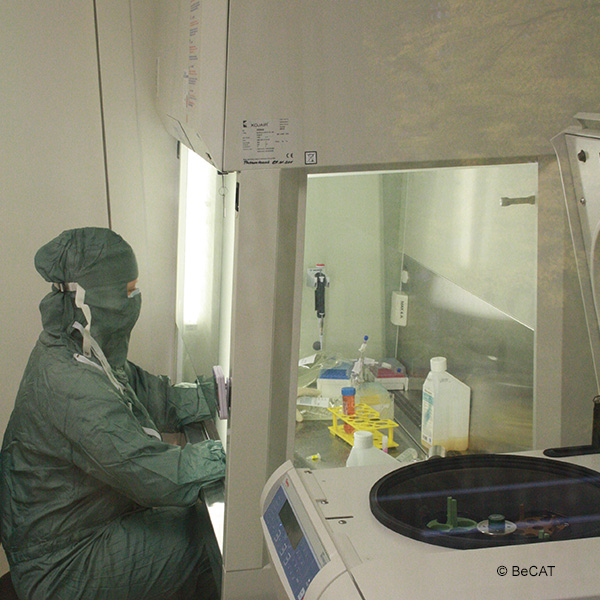State-of-the-art pharmaceutical research at BeCAT

Scientific advances in cellular and molecular biotechnology have led to the development of novel therapies. Above all, innovative therapy and production approaches with pharmaceuticals are increasingly moving into focus. While in pharmaceuticals so far mainly chemically or biotechnologically produced molecules have served as active ingredients, this task is taken over in the ATMP of cells.
Today, it is possible to selectively isolate a large number of different immune cells from the blood or tissue and then either only multiply, genetically modify them, or even transplant them together with certain biomaterials into the body of the patient. ATMPs are often customized to the patient and are significantly more complex both to manufacture and to use than traditional drugs. In recent years, there have been tremendous research successes in the area of ATMP and the first products are just now hitting the market, with others on the way. At the same time, a complex regulatory environment is developing in the innovative technology sector. This new class of pharmaceuticals has great potential in the direction of future therapies.
From preclinical study to patient trial
The development of ATMP requires a completely new transdisciplinary structure in both fundamental and technology research, but also in the regulatory and medical-ethical area. Within BeCAT, the focus is on four areas of research:
- Cell-based product development to promote endogenous regeneration,
- Tissue engineering and development of combination products,
- Development of cell-based gene therapeutics for gene repair, and
- Development of targeted tumor therapies with immune cells.
The goal of the scientists is the (initial) clinical application of this novel class of pharmaceuticals based on extensive preclinical studies. This involves, among others, using novel cell characterization technologies (single cell analysis) and increasingly replacing traditional animal models with more clinically relevant ones. In addition, a major research focus is the development of “organ-on-the-chip” all the way to “human-on-the-chip” technologies. In order to be able to make the step toward clinical application, a stable process is needed in the production of investigational medicinal products and a highly competent, diversified, and internationally recognized infrastructure for early clinical trials, which the BeCAT at the Charité in cooperation with the Berlin Institute for Health Research (BIG) can draw upon.
The Charité departments involved include oncology, immunology, molecular biology, genetics, transplantation medicine, and nephrology as well as cardiology, cardiosurgery, and traumatology. Scientists, clinicians, engineers, and other experts (such as IT and AI experts) are working together on different platforms in terms of topics and projects. Only in this way can they meet the complexity of research and clinical development and play a visible role internationally. This increases the opportunity to translate scientific, technological, and clinical innovation into novel treatment concepts with a high degree of quality and speed.
Centerpiece of BeCAT: New research building with state-of-the-art equipment
BeCAT creates structural and spatial conditions for innovative ATMP therapies with a high degree of both scientific and technological quality. The centerpiece of BeCAT is the new research building with a state-of-the-art GMP laboratory unit, which will enable the production of all ATMP classes in conjunction with biomaterials and 3D bioprinting. The new building will be funded by the Federal government and the State of Berlin and is expected to be completed in 2022.
At the BIONNALE 2019 on May 7, 2019, there will also be exciting lectures on “Advanced Therapy Medicinal Products.” You can find the agenda here.



